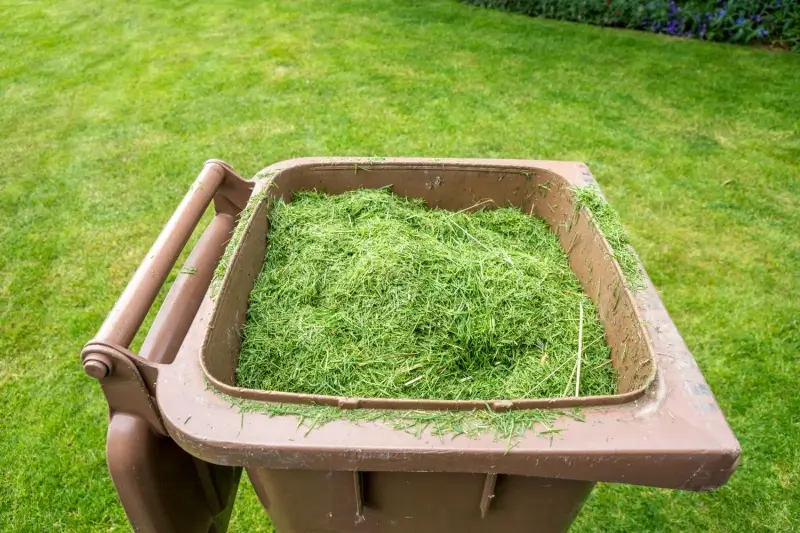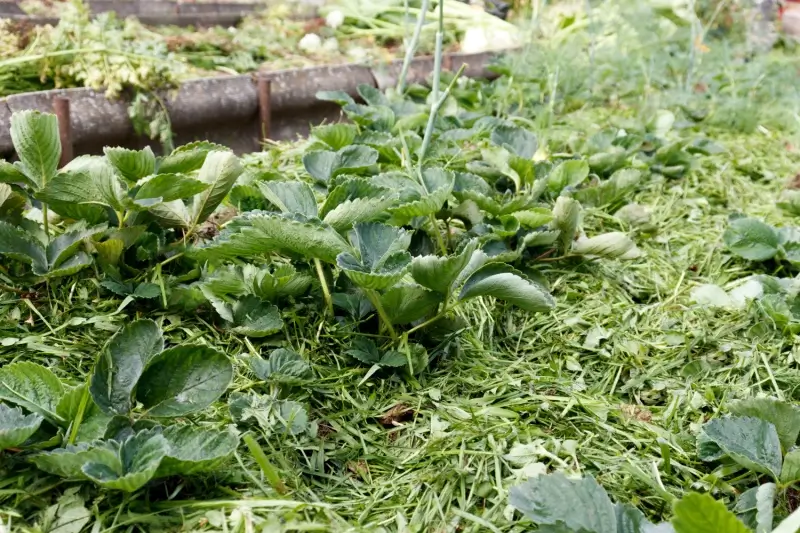
The Grounds Guys provide a guide on composting grass clippings:
|
Unsure of what to do with your grass clippings? Composting grass clippings is a simple yet powerful way to transform your lawn and garden maintenance routine into a sustainable and eco-friendly practice. By composting your clippings, you not only reduce waste and keep valuable organic matter out of landfills, but you can also create a nutrient-rich resource to nourish your landscape and improve the health of your soil. It’s a win-win!
Table of Contents:
Can You Compost Grass Clippings?
Grass clippings are an excellent addition to any compost pile or bin. Grass is rich in nitrogen, an essential nutrient that helps heat the compost pile and speed up decomposition.
Keep in mind that composting takes patience, knowledge, and practice. To successfully compost your clippings, you’ll need to understand how the composting process works.
What Happens to a Pile of Grass Clippings During Composting?
When you add grass clippings to your compost pile, microorganisms like bacteria and fungi begin to break down the tissue of the grass. As the microbes consume the nitrogen and carbon in the grass, they generate heat as a byproduct. This heat kills off weed seeds and pathogens. As the decomposition progresses, the complex carbohydrates, proteins, and fats in the grass break down into simpler compounds.
In the later stages of composting grass clippings, the remaining grass material undergoes humification, which converts it into a stable, dark, spongy substance called humus. This is what you’ve been waiting for. Humus is the nutrient-rich product of composting that benefits the soil.
How to Compost Grass Clippings

The key to successful composting centers on getting the carbon-nitrogen balance right. This is the first lesson in how to compost grass clippings. "Brown" materials are organic materials with high levels of carbon and include things like leaves, pine needles, paper, wood chips, and cardboard. “Green” materials are those higher in nitrogen and include grass clippings, fruit and vegetable peels, eggshells, coffee grounds, and weeds.
In your composting pile or bin, shoot for a ratio of 30 brown to 1 green. You’ll need far more leaves and cardboard than food waste and grass clippings. With that ratio in mind, you can start composting your grass clippings.
- Collect your grass clippings after mowing.
- In your compost pile or compost bin/tumbler, mix grass clippings (nitrogen) with brown (carbon) materials in a 30 to 1 carbon to nitrogen ratio. (Learn about the basics of building a compost pile.)
- Aerate your compost pile with the help of a garden fork or compost aerator to mix the materials and introduce air into the pile.
- Regularly add water to your compost pile to keep it moist but not soaked. Try to achieve the consistency of a wrung-out sponge.
- Every few weeks, use a garden fork to turn the compost pile, which redistributes the materials and introduces fresh oxygen into the mix. If you’re using a bin or tumbler, just use the handle to rotate it.
- Monitor the temperature of your compost with a compost thermometer. Look to reach a temp of 130-150 degrees Fahrenheit to ensure the heat kills pathogens and weed seeds.
- The composting stage is complete when the pile no longer generates heat and the material starts to look dark and crumbly. Let the compost cure for a few more weeks, and then start using it in your landscaping.
How Long Does It Take for Grass Clippings to Decompose?
The speed of the composting process depends on a number of factors, including the size of the clippings, the makeup of your compost pile, the temperature of your pile, and its moisture content. With that in mind, a well-balanced and managed compost pile can move through the decomposition process in one to two months. In less ideal conditions, the process may take three months or longer.
Many new to composting may be surprised that composting grass clippings take this long. But all those microbes have to do a lot of work to break down your grass clippings and other compost materials. Give them time and patience, and you’ll eventually enjoy wonderful, nutrient-rich humus as your reward.
Using Composted Grass Clippings in Your Garden

Now that your compost pile has given you rich compost, what should you do with it? The easiest way to utilize compost on your property is to use it as a top dressing for your lawn. Spread a thin layer of the compost, about two inches deep, over your grass. The natural fertilizer slowly releases essential nutrients into the soil. The compost not only nourishes your soil but also improves its structure, helping your grass roots grow deep and retain more water. These are just a few benefits of adding compost to your lawn.
You can also add the compost to your garden as a soil amendment, use it as a homemade potting mix, or layer it over your plant beds as a natural mulch.
Enhance Your Garden with Grass Clippings Composting
Composting grass clippings is not a simple or quick process, but it yields natural, eco-friendly fertilizer that can improve the vitality of your lawn and garden. As a bonus, it’ll keep your grass clippings out of a landfill, where they could break down and release harmful methane into the environment.
Of course, composting takes time and focus. If you’re struggling to find the time to care for your lawn, consider hiring a local team of experts. At The Grounds Guys®, we are happy to provide complete lawn and garden care for homeowners, property managers, and businesses. We can mow your lawn, take care of your garden, and perform the seasonal services that keep your landscape looking its best year-round.
Request a free estimate today.
This article is intended for general guidance only and may not be applicable to every situation. You are responsible for determining the proper course of action for your property and your situation. The Grounds Guys is not responsible for any damages that occur as a result of any advice or guidance derived from blog content. For the most accurate guidance, contact an independently owned and operated The Grounds Guys for more information and a professional on-site assessment.